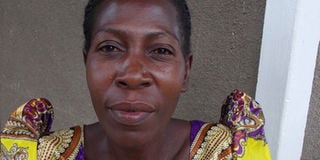How small loans transformed rural women’s lives

Caroline Nakato has built a house and installed solar power through small loans. Photo by Michael J Ssali.
What you need to know:
- As an HIV research project, Salama Shield Foundation in Lyantonde started as an effort to address factors leading women to engage in risky sexual behaviour. Along the way, the non governmental organisation has changed the fortunes of hundreds of women, writes Michael J Ssali.
On March 8 2018, as the world marked International Women’s Day, Janat Nayiga of Lwensinga Village in Lyantonde Rural Sub-County had a very special achievement to celebrate. She could not help telling her story to fellow women and other people gathered at Salama Shield Community Development Centre. Nayiga testified that from loans acquired at the centre, her family has bought beddings and other household items including solar electricity, which now lights their house at night.
Janat Nayiga, Caroline Nakato, and Joy Nakafeero are some of the many women with success stories to tell as a result of the many small loans offered by Salama Shield Foundation (SSF), based in Lyantonde District.
As an HIV research project, SSF took interest in the issues that led women to engage in risky behaviour like commercial sex and the resultant problems such as HIV infection, poverty, orphans, and vulnerability. Most of sex workers contracted HIV and lived in destitution, without life skills or income yet they had children to take care of. Many of them died and left behind orphans in the care of relatives or other charitable caretakers especially aged grandparents. SSF came up with a number of interventions such as encouraging HIV testing, reproductive health education, teaching sanitation and hygiene, environment conservation, agricultural training as well as providing small loans to uplift their livelihoods.
Janat Nayiga
“It was impossible for us to save enough money to build a house. Wherever we worked, we were paid only small amounts of money to spend on our immediate personal needs. Then one day in 2009 we were asked to attend a village meeting addressed by SSF officials. We were told to form groups in order to save money and get loans and how we could help one another to repay the loans. We later formed Lwensinga Women’s Group and joined SSF Micro-credit saving and Credit Scheme.”
Nayiga is grateful to her husband, Jackson Tumwine, for accepting to attend all the SSF training sessions. “We agreed that I should borrow the money from SSF and that we would both struggle to repay the loan. We also agreed that we would use the money to build a better house. My first loan was Shs200,000, which we used to buy bricks. It took us some six months to repay the loan. Then I took another loan of Shs200,000 to buy sand and other materials like eucalyptus for roof construction. After paying that loan I took another one of Shs200, 000 with which we bought iron sheets. Then I borrowed a similar amount to pay the builder. We have been taking loans of Shs200, 000 with which we have bought doors and beds. We now have mattresses and recently acquired a solar panel which lights the entire house at night.”
Caroline Nakato
Caroline Nakato lost her husband to HIV/Aids in 2007 and had four children to take care of. They lived in a mud and wattle house. “I belong to the same group as Nayiga. The difference between us is that my house had an iron roof and weak mud walls. Like her, I periodically took loans of Shs200,000 except once when I borrowed Shs400,000 for purchasing the metal doors and windows. The many loans that I took from Salama Shield Foundation were used to build new walls, doors, windows, and a solar panel for lighting and charging my phone which I also bought with money borrowed from SSF.” Some of the loans were used to improve her local liquor selling business from which she earned the money to pay for her two sons’ apprenticeship at a metal welding workshop in Lyantonde Town where they have since become self-employed.
How it works
Rose Kawere, the SSF Country Director, says nearly 2000 women in Lyantonde District have benefitted from the SSF revolving fund by periodically taking small loans. “We charge them a two per cent administration fee, which is meant to cater for stationary and transport expenses for our staff travelling to the villages to recover the money, sensitise them on various health and developmental issues and to check on their progress.”




